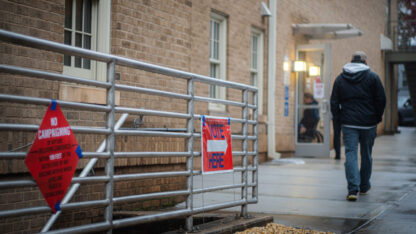For Georgians unhappy about rising property tax bills, lawmakers say they have a solution — a limit on how much of a home’s increasing value can be taxed.
With early balloting underway, voters are deciding on a state constitutional amendment that would limit increases in a home’s value for property tax purposes to the broader rate of inflation each year. It’s one of three statewide ballot measures that Georgia voters will decide on this election year.
Supporters say Georgia Amendment 1 — as it’s called on the ballot — will protect current homeowners from ever-higher property tax bills, but opponents warn that the caps will unfairly shift the burden onto new homeowners, renters and other property holders.
Georgia is one of eight states where voters will decide property tax measures Nov 5, a sign of how rising tax bills are influencing politics nationwide.
Most significant is North Dakota, where a referendum seeks to end the current property tax for all purposes except repaying existing debt. Many officials there, including traditionally low-tax Republicans, are fighting the measure, saying such a big change could disrupt essential state and local government services.
Questions are also on the ballot in Florida, Arizona, Colorado, Illinois, New Mexico and Wyoming.
With demand outweighing supply, housing prices are rising nationwide, and those increased values can show up in higher taxes.
From 2018 to 2022, the total assessed value of property across Georgia rose by nearly 39%, according to figures from the Georgia Department of Revenue. Most governments pocketed increased revenues without raising tax rates, boosting employee pay and other spending. Statewide property tax collections rose 41% from 2018 to 2022.
Lawmakers got an earful from constituents and responded with the proposed constitutional amendment. State Senate Finance Committee Chairman Chuck Hufstetler, a Rome Republican who helped write it, calls increases based on higher valuations “a backdoor tax increase.”
“I think that some of our homeowners, particularly the elderly, are getting taxed out of their homes,” Hufstetler said. “They don’t even have an income anymore, but yet their taxes are going sky high.”
The protection would last as long as someone owns their home. The assessed value would reset to the market value when a home is sold.
Dozens of Georgia counties, cities and school systems already operate under similar local assessment caps.
There’s little opposition, and early voters interviewed this week were universally favorable. Brad Turney, who owns a condo in Atlanta’s Midtown neighborhood, was among supporters.
“I don’t want it to get out of hand, and I think this might be helpful,” Turney said after voting in suburban Sandy Springs.
But school systems have been wary, warning that the cap could starve them of needed funds. That’s especially true because most school districts can’t raise property tax rates above a certain level.
To ease schools’ concerns, the measure gives local governments and school districts until March 1 to opt out. Any that do not would be permanently governed by the cap.
“You only have one time to opt out, and then you’re done,” said John Zauner, executive director of the Georgia School Superintendents Association. He expects many systems could exit.
Hufstetler said it would be a “mistake” to opt out.
Assessment caps lead to disparities, with people paying higher taxes than their neighbors just because they bought a house later. Audrey Yushkov, a senior policy analyst with the Tax Foundation, warned that the measure could make purchasing a home more difficult in the future, because new buyers would face higher bills and longtime owners would have an incentive to stay in their current houses to keep their tax bills low. The Tax Foundation is a Washington, D.C.-based group that is traditionally skeptical of tax hikes.
“There is this lock-in effect for current homeowners and a lock-out effect for new homebuyers,” Yushkov said.
Those effects are rampant in California, which pioneered an even stricter assessment cap, Proposition 13, in 1978.
Yushkov also noted that higher tax bills would be passed on to renters because the amendment doesn’t shield apartments and other commercial property from higher assessments.
The measure also includes a provision letting city and county governments increase sales taxes by a penny on every $1 of sales to replace property taxes. Hufstetler lauded that provision, saying it would allow governments to tax visitors to pay for local services. But Yushkov called it a loser, saying property taxes are more transparent because people get one big yearly bill and because the services are clearly linked to the taxes.
WABE News contributed to this report.










